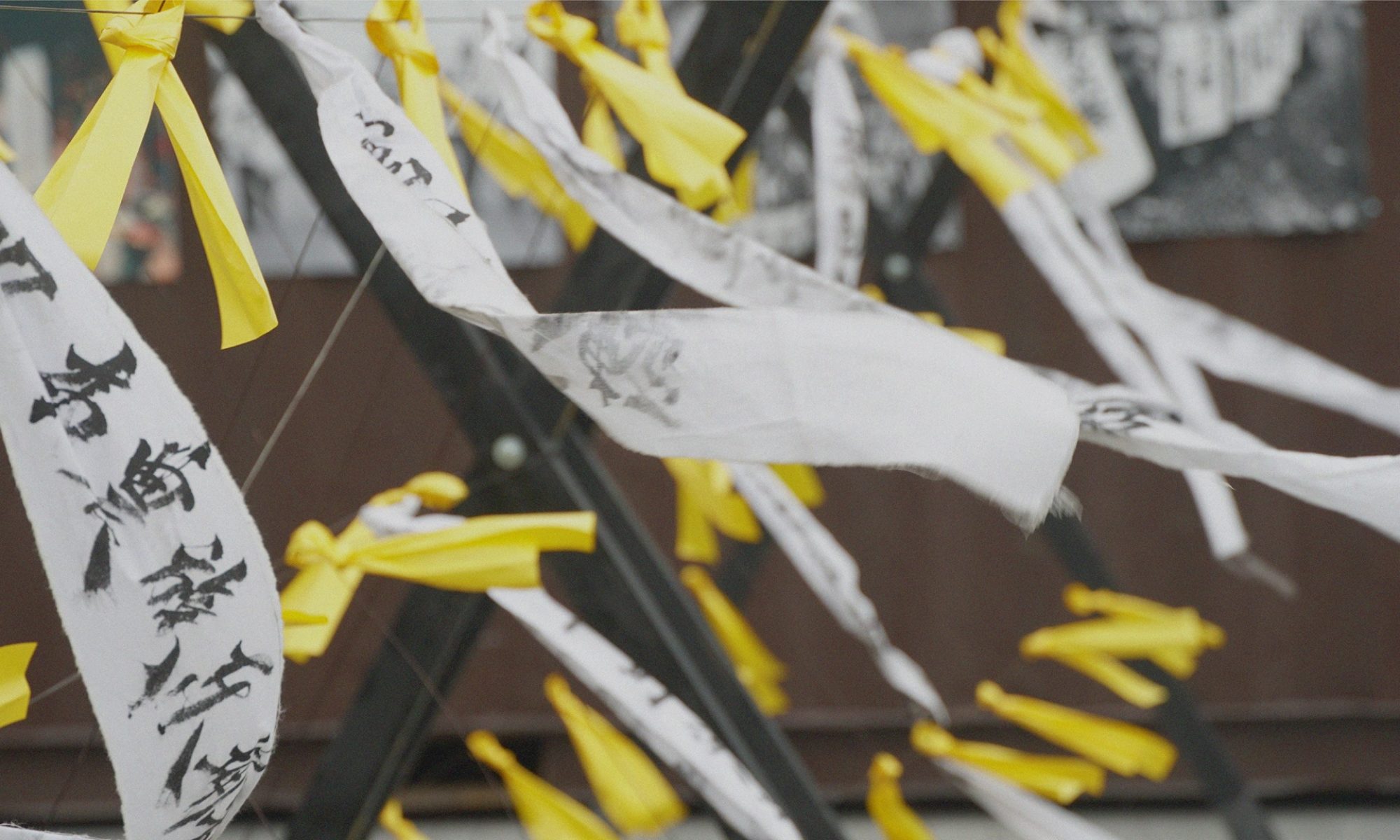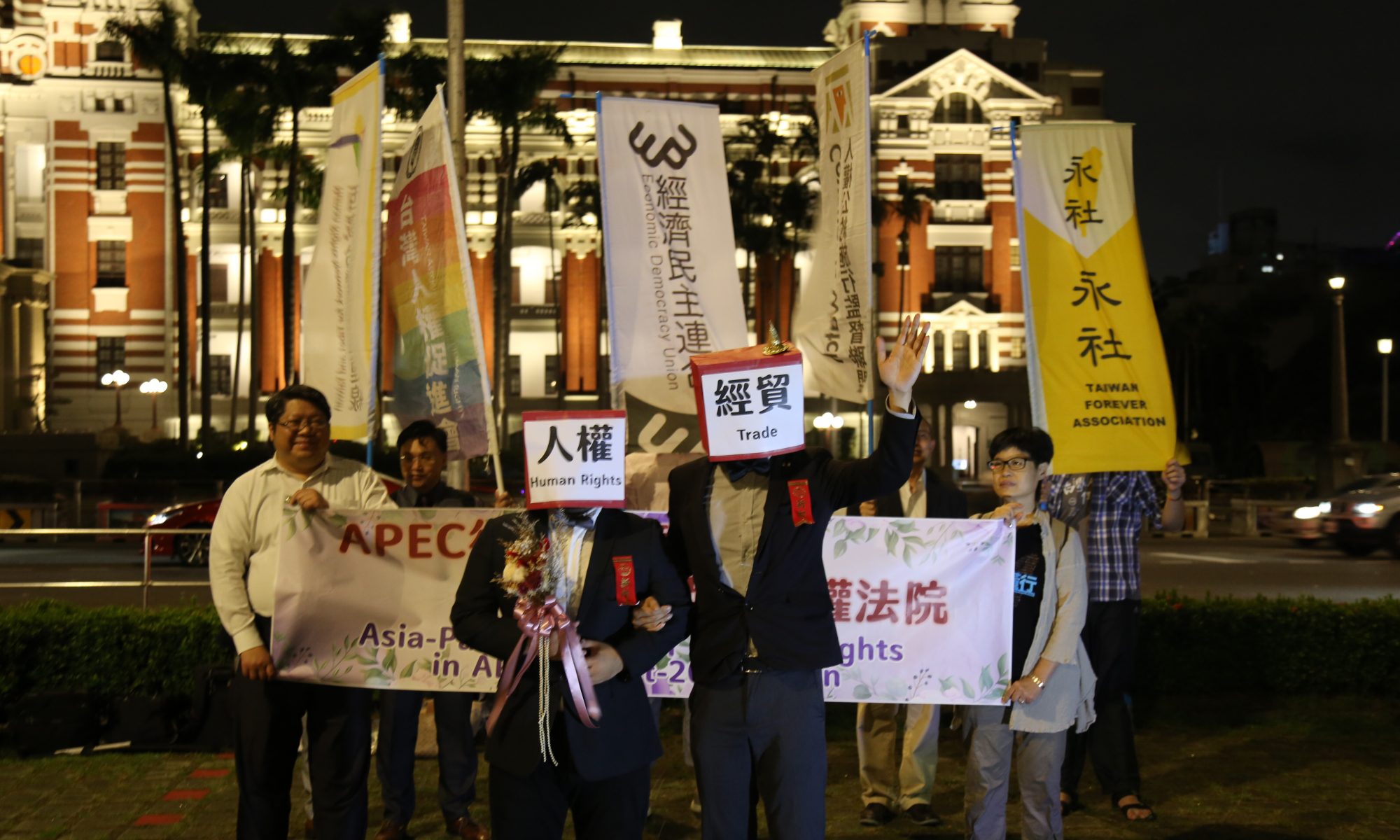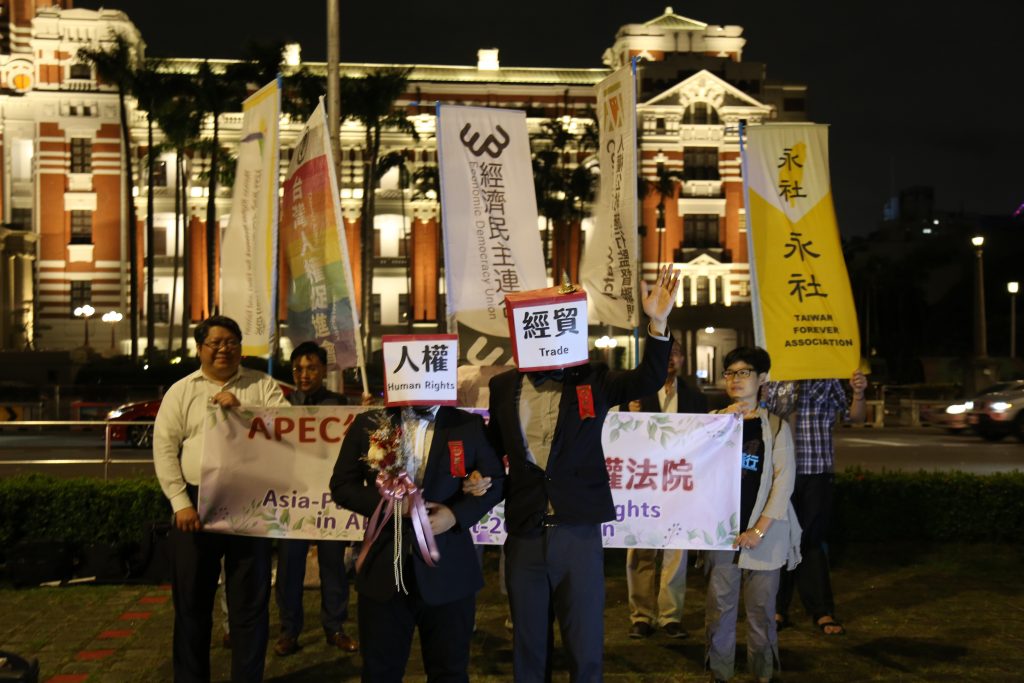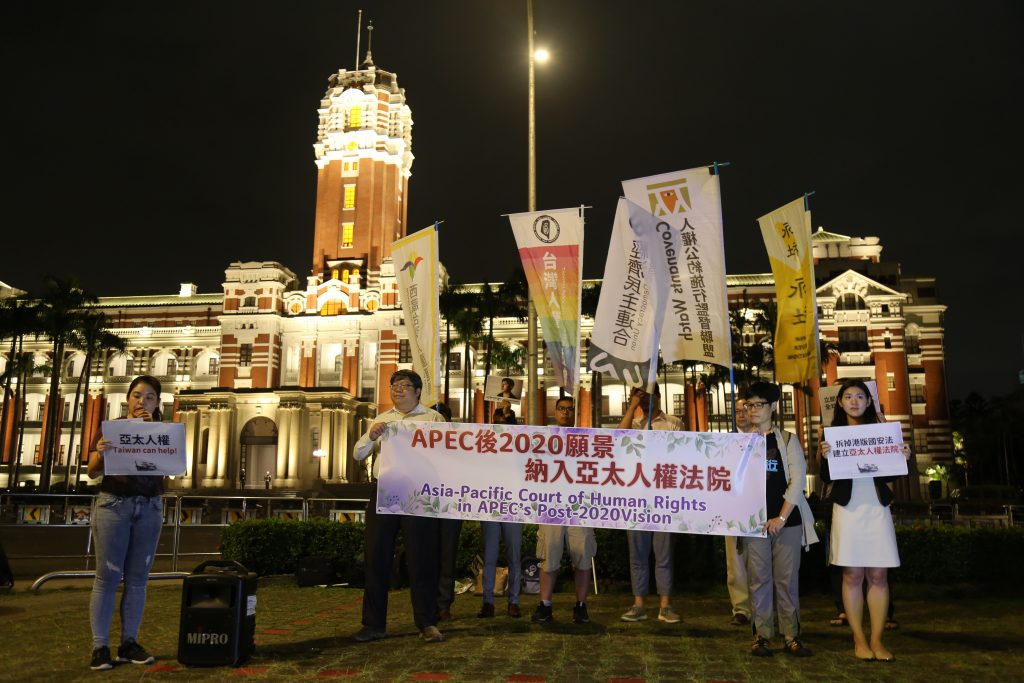
今年APEC領袖峰會採視訊方式,台灣代表張忠謀預計於總統府出席線上會議。經濟民主連合、台灣人權促進會、人權公約施行監督聯盟、民間司法改革基金會、香港邊城青年等公民團體於今日(20日)下午,前往APEC會議場外召開記者會,訴求「APEC後2020願景」應納入「亞太人權法院」等永續目標,為亞太經貿整合的進程,立下包括保障人身安全、人身自由的人權基礎。
日前,APEC主辦國部長級代表強調,「APEC後2020願景」著重於未來區域發展的永續性。公民團體呼籲,跨境人員的人身安全、人身自由作為投資環境永續發展的必要保障,不應該被忽視。
公民團體於記者會現場,表演行動劇,藉舉行「經貿」與「人權」的婚禮,表達若要實現永續的區域經貿發展,則必須與人權價值緊密結合。香港邊城青年理事長李芃萱指出,行動劇希望提醒大家,經濟發展固然重要,然而人權才是人民最基礎的保護傘;若沒有了人權,人民暴露於公權力與企業的黑手之下,就算賺再多錢也沒有命花。
李芃萱批評中國近年來在國際場合,不斷以發展權的概念偷換原本的人權觀,試圖用集體的「發展」,來正當化對個別群體的人權侵害。她呼籲參與APEC會議的各國代表未雨綢繆,未來應增列「人權對話」議程,逐步建立亞太人權保障的共識;同時,公民團體要求參與APEC、聲稱追求區域共同目標的中國政府,停止侵害人權,並立即釋放李明哲、12港人、札西文色等遭中國不正當司法程序關押的國際救援對象。
推動亞太人權法院納入「APEC後2020願景」
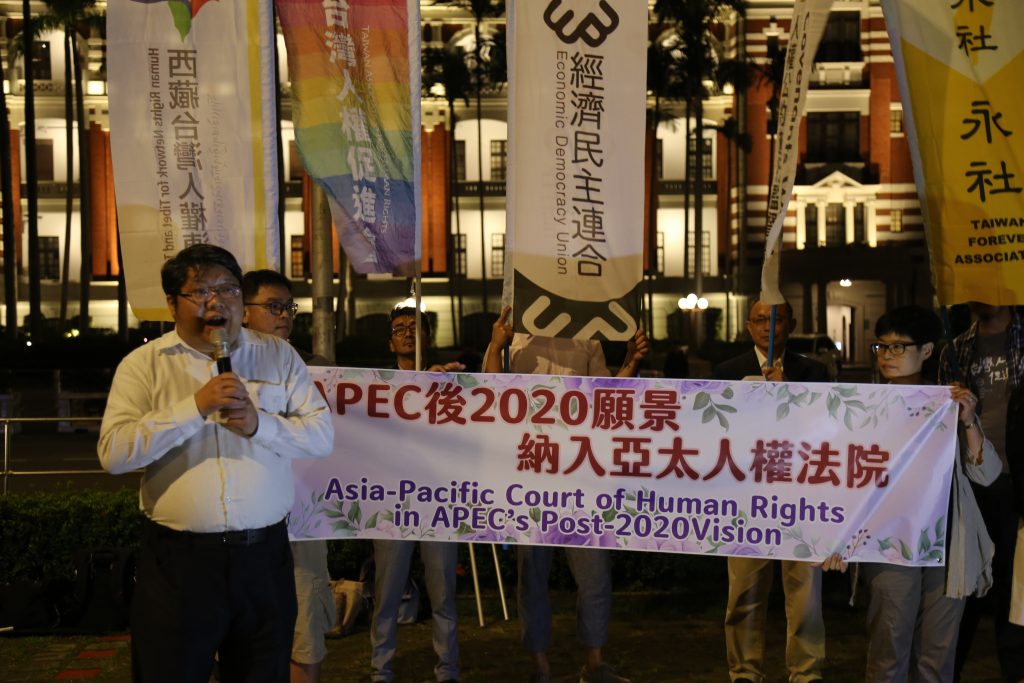
經濟民主連合智庫召集人賴中強表示,過去民間團體將推動台灣參與國際組織的重點放在向聯合國及世界衛生組織敲門,反而忽略了台灣已是會員國的APEC。未來,台灣民間團體會強化對於APEC的持續關注與參與,要讓APEC成為台灣向國際發聲,與國際合作的重要場域。11月16日舉行的APEC部長會議已推動亞太自由貿易區(FTAAP),於2040年前打造開放、動態、強韌、和平的亞太社群,作為APEC的「後2020願景」。賴中強指出,國際間無論貨物貿易、服務貿易或投資的開放,最終都會涉及自然人的跨境流動,亞太地區必須要有一個能確保人員跨境流動的人身安全與人身自由人權機制,才能真正實現開放、強韌的亞太社群。近年來,中國對於人權的迫害,乃至於港版國安法的實施,都讓亞太地區商務活動的風險,更加沒有保障;推動亞太人權法院,並將其納入亞太自由貿易區(FTAAP)的機制,應該納入APEC的後2020願景。過去一個月以來,台灣民間團體舉行了三場記者會,倡議亞太人權法院,呼籲中國釋放人權遭迫害者,未來台灣的民間團體還是會持續發聲,透過各種努力,與國際友人一起合作,推進人權保障。我們是小國小民,但也是好國好民。
要求習近平釋放李明哲、12港人、札西文色
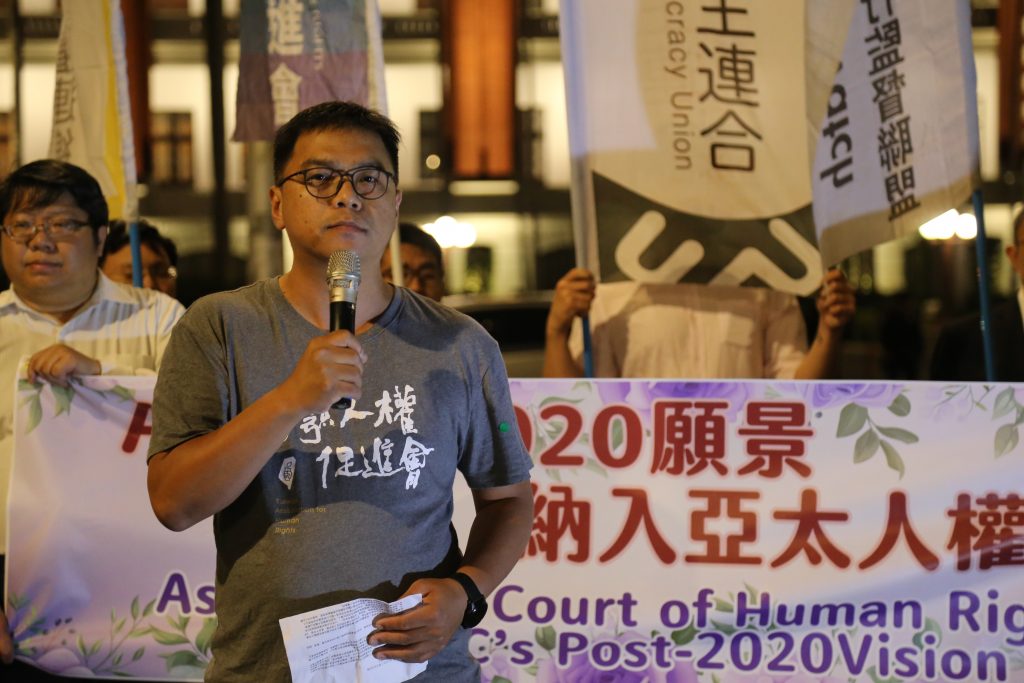
台灣人權促進會秘書長施逸翔表示,儘管公民團體於11月12日呼籲台灣代表向中國提出國際救援名單,但龔明鑫主委與鄧振中代表在會議上支字不提人權議題,令人遺憾。他呼籲今晚出席領袖會議的張忠謀先生,正視區域人權議題,並積極啟動亞太人權法院倡議。
施逸翔也在場外要求與會的中國國家主席習近平釋放國際救援對象,他特別強調三個分別來自台灣、香港、與西藏,正被中國政府關押的緊急個案。其一是台灣人李明哲。李明哲是關注中國社會發展的台灣NGO工作者,於2017年入境中國珠海後失蹤,數月後遭判處有期徒刑5年,是首位以「顛覆國家政權罪」入獄的台灣人。再者,全球正積極救援12港人——李宇軒、張俊富、張銘裕、喬映瑜、嚴文謙、鄭子豪、廖子文、鄧棨然、郭子麟、李子賢、黃臨福、黃偉然——今年8月23日,這12名港人打算前往台灣尋求庇護,但在途中遭到中國政府攔截,現被扣押於中國深圳市鹽田區的看守所。當中10名涉事者家屬曾多次安排委託律師要求與扣押港人會面,但均被中共政權拒絕,他們可能面臨酷刑對待。
最後,施逸翔提到正遭中國監禁的藏語倡議者札西文色(Tashi Wangchuk),他僅是非常溫和地根據中國憲法所保障的語言文化權利,以體制內的合法管道提出他的訴求,倡議政府應該保障西藏語言與文化的實踐,卻被中國政府以「煽動分裂國家罪」重判5年。施逸翔表示,札西文色曾在法庭上辯護「他只是想用訴訟手段迫使地方政府不再忽視藏語教育,他是行使公民的批評權;而非試圖分裂國家」。施逸翔認為,若APEC設有亞太人權法院,即有管轄權審理李明哲、12港人、札西文色等人權案件。
西藏台灣人權連線理事長、在台藏人札西慈仁指出,許多藏人因倡議學習藏語的權利、保護環境、信仰宗教,甚至只是維持自己傳統的生活方式,就遭到中國政府的迫害、關押、判刑、被失蹤或殺害。他說,在西藏,「身為藏人」這件事,就足以構成成為政治犯的條件。他要求中國政府,不僅要釋放扎西文色,更要釋放至少數千位被關在中國監獄的西藏政治犯。
呼籲APEC增列人權對話
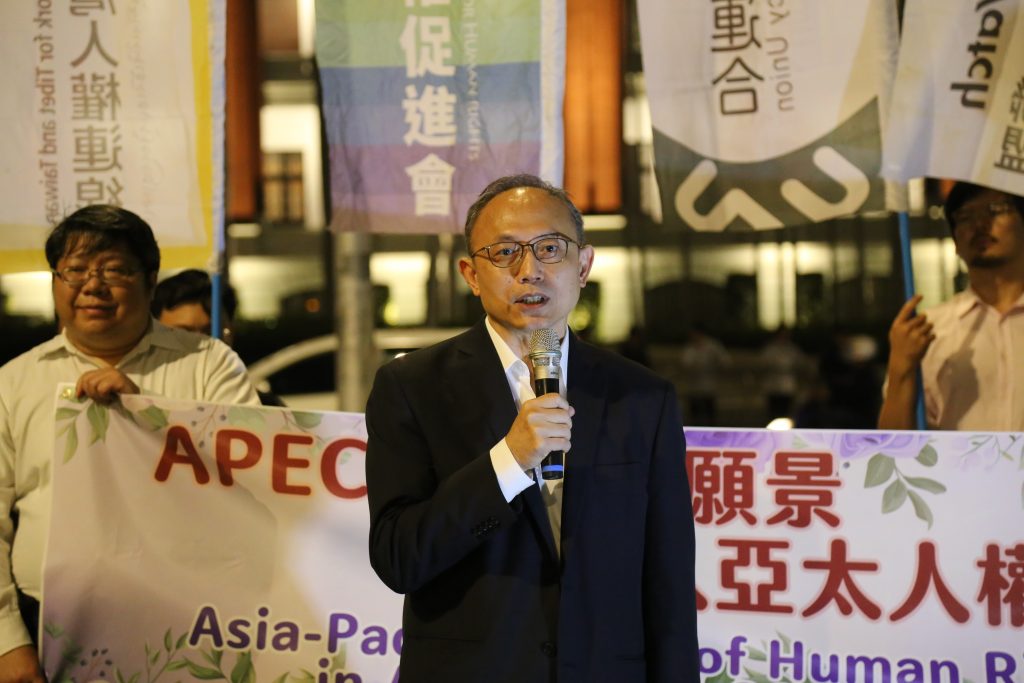
人權公約施行監督聯盟召集人黃嵩立認為APEC應該將聯合國會員國於2015年所通過的《2030年永續發展議程 Sustainable Development Agenda》,其中17項發展目標(sustainable development goals, SDG)納入議程。他說明,聯合國這份文件聲稱為人類現在和將來的和平與繁榮,提供了共同的藍圖,而SDG更是被視為經濟發展的人性面。在聯合國和多邊合作的場合,都不斷強調SDG的重要性,APEC也不例外。他進一步解釋,SDG因為強調婦女、兒童、貧窮、教育、營養等議題,而被認為是用以補充經濟發展的另類目標。
同時,他強調,APEC必需要認知SDG 的不足:以SDG和兩公約對照,SDG偏重於經濟社會權,而缺少了核心的公民權,也就是人身安全與思想自由、言論自由、結社自由等基本人權,以及政治參與的權利。
黃嵩立向APEC呼籲,各項權利不可分割、互相倚賴。當APEC將人權納入議程時,應該同時著重公民權、政治權,才能保障各個國家維持基本的社會正義。他提醒APEC,中國在聯合國人權委員會不斷努力,把「發展」(尤其是經濟發展)置入到各種人權文件中,試圖混淆中國式的、只重經濟發展而忽略人民基本人權和自由的發展模式,成為人權的一種類型。他認為,APEC應同時強調各項基本人權,並且在APEC架構下籌設人權保障機制,逐漸朝亞太人權法院邁進,這才是真正能讓人民安全、自由、自在的發展之路。
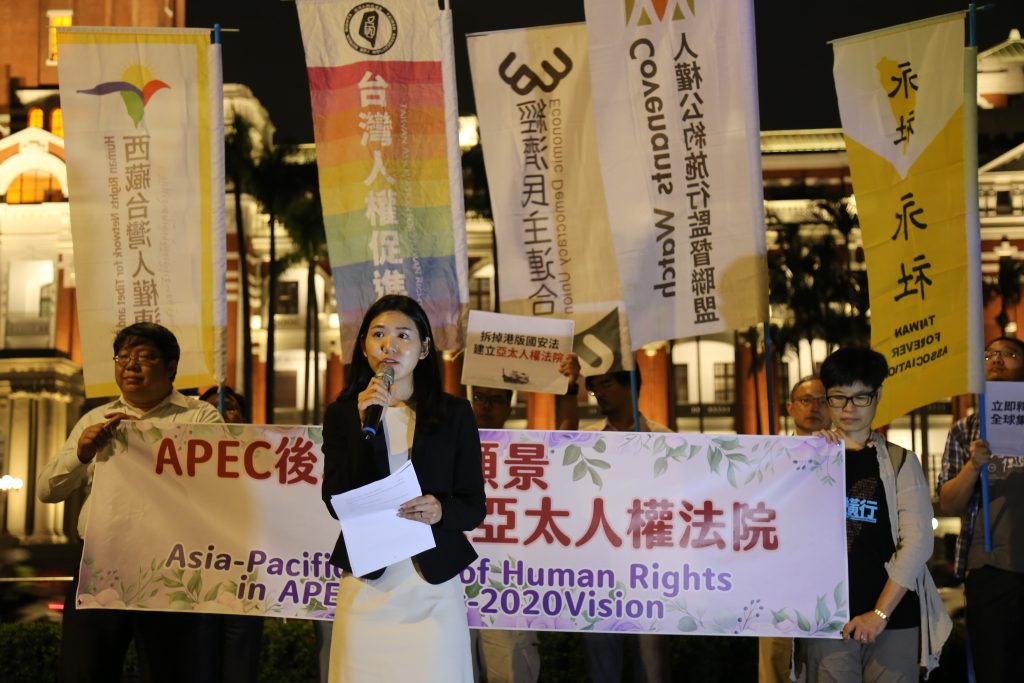
司改會國際合作組義務律師邱瀞慧表示,即便APEC明文目標在於透過經濟整合和永續發展為亞太區域創造繁榮,但經貿是讓人民富足、安樂的手段,因此無法與人權脫鉤。她強調,經貿整合的永續發展包括開發中產生的環境破壞、跨境移工販運、勞動剝削,和跨境商務工作者人身安全保障等問題,全應該被包在「人權」這個大雨傘下,每年於APEC峰會期間討論共識。
她解釋APEC的議程設定仍隨著歷史條件而調整,未來增列「人權對話」既必要且可行。歷年來,APEC除了注重經濟發展,還陸續設立了「永續發展小組(Sustainable Development Group)」、「健康小組(Health Group)」,還有「女性與經濟政策同盟(Policy Partnership on Women and Economy)」等與環境權、健康權、性別平權相關的對話機制。她質問,既然有這些涵蓋廣義人權的平台,那當然能設立一個「人權對話」,來討論當年度的重大人權議題。
⏥ 記者會訴求
- APEC後2020願景,納入亞太人權法院。
- APEC年會應有「人權對話」。
- 中國立即釋放李明哲、十二港人和扎西文色。
⏥ 記者會資訊
|時間:2020年11月20日(五)下午6:30
|地點:總統府前停車場(面對總統府右側;凱達格蘭大道與重慶南路交會處)
|出席:
賴中強|經濟民主連合智庫召集人、執業律師
施逸翔|台灣人權促進會秘書長
黃嵩立|人權公約施行監督聯盟召集人
邱瀞慧|司改會國際合作組義務律師、執業律師
札西慈仁|西藏台灣人權連線理事長、在台藏人
|主持:
李芃萱|香港邊城青年理事長
|媒體聯絡人:
歐栩韶(0975-173-559|經濟民主連合副研究員)
Morris Chang, the representative of Taiwan to the APEC, is expected to attend the virtually held APEC Economic Leaders’ Meeting of 2020 in the Presidential Office Building. Civil society organizations including Economic Democracy Union, Taiwan Association for Human Rights, Covenants Watch, Judicial Reform Foundation, and Hong Kong Outlanders held a press conference outside the conference venue (the Presidential Office Building) on the 20th’s evening, calling for the inclusion of Asia-Pacific Court of Human Rights and other sustainable goals in the APEC post-2020 Vision, to establish regional human rights mechanisms for the process of Asia-Pacific economic and trade integration.
Recently, the ministerial representative of the APEC host country emphasized that the APEC post-2020 Vision will focus on the sustainability of regional development. Civil society organizations urged the emphasis of protection of safety and liberty of transnational personnels as the necessary protections for sustainable developments of the investment environment.
Civil society organizations presented a performance of “wedding” between “trade” and “human rights”, to convey the importance of human rights protection mechanisms for the sustainable development of regional economic and trade integration. APEC shall also set up the “Human Rights Dialogues” agenda to gradually lay the foundation for regional consensus on human rights protection.
Lee Penghsuan, Chair of Taiwan Hong Kong Outlanders criticized how China has repeatedly attempt to exchange the original concepts of human rights with only the right to development, using the “development” of the bigger population to cover up the human rights abuses on individuals. She called on every APEC representatives to be one step ahead and include “Human Rights Dialogues” in the agenda while working on establishing a consensus on the protection of Asia-Pacific human rights; meanwhile civil society organizations urge the Chinese government, which participates in APEC and claims to pursue common regional goals, to stop the infringement on human rights, and immediately release Li Ming-Che, the 12 Hong Kong youths, Tashi Wangchuk and others whom were detained by the undue process of China.
The Inclusion of Asia-Pacific Court of Human Rights in the Post-2020 Vision
Lai Chung-Chiang, Convener of Think-tank of Economic Democracy Union who is also a practicing lawyer stated, “In the past, civil society organizations has been focusing on advocating Taiwan to participate in international organizations especially the United Nations and World Health Organization, but neglecting APEC, to which Taiwan is a member already. In the future, civil society organizations will be enhancing our attention and participation on APEC, letting APEC become one of the most important world stages for Taiwan to speak and cooperate with the world.” The APEC Ministerial Meeting held on November 16th proposed the FTAAP, and that APEC’s “post-2020 vision” is trying to build an open, dynamic, strong and peace community for Asia-Pacific by 2040. Lai established that no matter how much more opened are the cargo trades, service trades and investments, it will ultimately come back to the cross-border mobilization of personnels, for that the Asia-Pacific region will need a complete mechanism to protect personal safety and personal freedom of the presonnels, and thus the open, strong Asia-Pacific community shall be complete. In recent years, from China’s persecution on human rights to the enaction of the Hong Kong national security law, it has put the safety of business activity around Asia-Pacific at stake; we should advocate on the Asia-Pacific Court of Human Rights, including it in the mechanism of FTAAP and also APEC’s post-2020 vision. “During the past month, Taiwanese civil organizations have held three press conferences to propose the idea of Asia-Pacific Court of Human Rights, called on China to release those whose human rights has been infracted. We will make sure our voices are heard, and keep pushing, along with help from our international friends, to enhance the protection on human rights. We are small citizens from a small country, but we are good citizens from a good country.” says Lai.
Urging President Xi to Release Li Ming-Che, the 12 Hong Kong youths and Tashi Wangchuk
“Even though the civil society organizations has called on Taiwanese representatives to present the list of persons under rescue to the Chinese representative, however there was still no mentioning of human rights issues during conference by Taiwanese representatives, which was a huge let-down.” says, Shih Yi-Hsiang, Secretary-General of Taiwan Association for Human Rights. He also called on the Taiwanese representative leader, Morris Chang to face the issue of regional human rights, and start advocating for the Asia-Pacific Court of Human Rights.
Shih also asked the Chinese President Xi Jinping to release international political dissidents. He especially brought attention to three of the urgent individuals that are jailed by the Chinese government, who were individually from Taiwan, Hong Kong, and Tibet. One of them being Li Ming-Che. Li is a Taiwanese NGO worker who pays close attention to the social development of China, however went missing ever since he entered China in 2017 via Zhuhai, then got sentenced for five years after months and was the first Taiwan to be imprisoned in the accusation of “inciting subversion of state power”. Also, the 12 Hongkongers who was originally on their way to Taiwan to look for refuge but was instead stopped and arrested on their way by the Chinese government, they are also still under detention. 10 of the 12 Hongkongers’ family has tried multiple times to let them meet with an eligible lawyer, but was refused by the government, they worry that those Hongkongers might be facing torture.
At last, Shih spoke about Tashi Wangchuk, an activist of Tibetan language and is now under detain. Shih says Tashi Wangchuk was only advocating his appeal through legal progress on the ground of the right to protect language and culture, which according to the Chinese Constitution, is his eligible right. Yet he was sentenced for five years under the accusation of “inciting secession of state power”. Shih states, “had APEC set up the Asia-Pacific Court of Human Rights, it will have the jurisdiction to trial on human rights violation cases such as the above mentioned.”
Tashi Tsering, Chair of Human Rights Network for Tibet and Taiwan, who is also a Tibetan in Taiwan pointed out that, a lot of Tibetans were persecuted, detained, sentenced, missing or killed for advocating the rights to learn Tibetan language, protecting the environment, practicing their religion belief, or even as simple as maintaining their own traditional way to live. Tashi Tsering says, “In Tibet, the fact that ‘born a Tibetan’ can alone be the reason for someone to become a political dissident.” He urges the Chinese government with not only the immediate release of Tashi Wangchuk, but also the thousands Tibetan political prisoners locked in the Chinese prisons.
Urging APEC to Include “Human Rights Dialogues”
Huang Song-Lih, Convener of Covenants Watch believes that APEC should be including United Nation’s 17 Sustainable Development Goals in the agenda. He states, “This resolution of the United Nations claims to be the blueprint that will bring peace and prosperity for the human being, the SDGs was even being seen as the humanity of economic development.” Whether at meeting held by the United Nations or multilateral meetings, the importance of the SDGs was emphasized repeatedly, including meetings of APEC. Huang then explained, “The SDGs emphasized on women, children, poor, education, nutrition related issues, and these issues are seen as the alternate goal for supplemental economic developments.”
Huang also stressed that APEC should be aware of the SDGs’ insufficient: comparing the SDGs to the two human rights covenants, the SDGs lays more attention on the economic and social rights, lacking the core of civil rights, which are basic human rights such as personal safety and the freedom to think, speak and gather, and the rights to political participation.
Huang urges APEC to value how each right is dependent on one another. It is only when APEC includes human rights into their agenda and lay attention on civil rights and political rights, can we make sure that each country maintains basic social justice. Huang pointed out, “China is now working their way in the Human Rights Council, trying to insert ‘development (especially economic development)’ as a criteria to resolutions after resolutions, trying to make the economic-emphasized but basic-human-rights-lacking Chinese model as type of human rights.” Therefore, Huang thinks that the only way to ensure people’s safety, freedom and comfort is for APEC to emphasize on all kinds of basic human rights, start arranging human rights protection mechanisms and heading for the establishment of Asia-Pacific Court of Human Rights.
Chiu Chin-Huei, Pro-bono lawyer at international taskforce of Judicial Reform Foundation says that, even if APEC states their goal to be creating prosperity for the Asia-Pacific region through the integration of economic and sustainable development, however, economy and trade should be the way for people’s abundance and happiness, thus they can never be discussed without involving discussion of the human rights. Chiu emphasized, “the sustainable development for the integration of economic and trade includes issues such as environmental damage caused during development, cross-border labor trafficking, labor exploitation and cross-border business personnels’ personal safety. The above should all be under the topic of ‘human rights’ and be discussed every year at APEC’s annual meetings.”
Chiu explained, APEC’s agenda has been adjusted over the year to fit the historic criteria, to list “Human Rights Dialogues” on the agenda is both necessary and doable. Through the past years, APEC not only emphasize on the development of economic, but also the establishment of Sustainable Development Group, Health Group and Policy Partnership on Women and Economy has helped with the dialogue on rights of environment, health and gender equality. Chiu stated, since we can establish platforms for these rights that are generalized human rights, then we can start a “human right dialogue” to talk about annual major human rights issues for sure.
Appeals of this Press Conference
1. Asia-Pacific Court of Human Rights in APEC’s Post-2020 Vision.
2. APEC Should Include Human Rights Dialogues.
3. China Release Li Ming-Che, 12 Hongkongners and Tashi Wangchuk.
|Time: 2020 Nov. 20th (Fri.) 18:30
|Location: Parking lot in front of the Presidential Office Building (intersection of Ketagalan blvd. and Chongqing S. Rd.)
| Speakers:
Lai Chung-Chiang|Convener of Think-tank of Economic Democracy Union, practicing lawyer
Shih Yi-Hsiang | Secretary-General of Taiwan Association for Human Rights
Huang Song-Lih| Convener of Covenants Watch
Chiu Chin-Huei| Pro-bono lawyer at international cooperation taskforce of Judicial Reform Foundation, practicing lawyer
Tashi Tsering|Chair of Human Rights Network for Tibet and Taiwan, Tibetan diaspora in Taiwan
|Moderator
Li Peng-Hsuan | Chair of Hong Kong Outlanders
|Media contact:
Ou Hsu-Shao (+886 975-173-559) | Junior Researcher of Economic Democracy Union.
